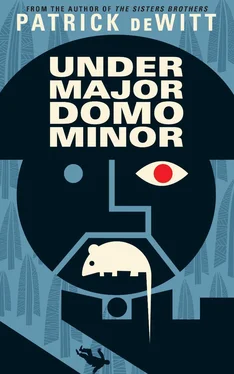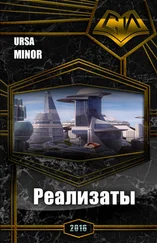“He will snatch it up from my hand, do you mean?” Lucy asked.
“Just so, yes. It is an unorthodox method, I know, but we are on our own, here, and we must make do.” Mr Olderglough scratched his chin. “You’re looking at me as though you have a question.”
“Yes,” said Lucy. “I’m wondering how it came to be that the mail was collected in this way.”
“Ah, I bribed the engineer,” said Mr Olderglough. “Actually, I continue to bribe the engineer. Possibly that sounds untoward, but it’s only a pittance, and if the truth should be known, I get a thrill from it. Touch of criminality, thickens the blood — you didn’t hear it from me, boy. Now you’re looking at me with another question.”
Lucy nodded. “The engineer, sir. Will he have letters for me as well?”
“No, he won’t. The Baron’s is a one-sided correspondence.”
Lucy pondered the definition of the word. “I was unaware there was such a thing,” he admitted.
Mr Olderglough’s face puckered, as one stung by a discourtesy. “Is this a comical observation?” he asked.
“It was not meant to be, sir, no.”
“I certainly hope not. Because I don’t subscribe to amusements, Lucy. Laughter is the basest sound a body can make, in my opinion. Do you often laugh, can I ask?”
“Rarely.”
“How rarely?”
“Very rarely, sir. Extremely rarely, in fact.”
“Good,” Mr Olderglough said. “Good. Now. These letters are of the most pre-eminent importance to the Baron, and must be handled with the greatest respect and discretion. No peeking, is what I’m saying here.”
“I would never, sir.”
“You will want to.”
“Be that as it may.”
“And, if there ever comes a day where the engineer does have a letter for you, this should be treated with utmost seriousness. I suspect this will never happen. Actually I can say with confidence that it won’t. Still and all, you have been instructed, have you not?”
“I have been instructed, sir.”
Mr Olderglough stole a glance at the contents of Lucy’s valise. “Where is your day suit, boy?”
“I haven’t one, sir.”
“What — do you mean?”
“I mean that I am not in possession of a day suit, sir.”
“Well, what do you have in the way of evening attire, then?”
“This is my attire in its entirety,” said Lucy, pointing to his worn out suit of clothes.
Mr Olderglough regarded the ensemble with unambiguous indignity. “Did it not occur to you,” he said, staring glumly at Lucy’s sheepskin cap, “that you would be expected to dress in a manner befitting your appointment?”
Lucy considered the question. “I will admit to being aware of a style of dress common among those working in places such as this,” he conceded. “But I suppose I assumed that my employer might furnish me with said attire, were it required of me to wear it.”
“I see. And who was it that gave you this idea, I’d like to know?”
“No one, sir. It came to me independently.”
“It’s a bold notion.”
“I was not after boldness.”
“You achieved it.”
“I’m sorry if I’ve offended you.”
“You have annoyed me mildly. It is abating as we speak.” Mr Olderglough looked out the window, and back. “Has anyone ever told you you possess a likability?”
“Not that I can recall, sir, no.”
“You possess a likability.”
“I’m happy to hear as much.”
“Yes. Well. Perhaps something can be done about the situation at a later date, but until that point in time, we will get by with what’s available to us.”
“Just as you say, sir.”
Mr Olderglough moved again to exit the room, but in turning the doorknob he found himself transfixed by its apparatus, so that Lucy asked him, “Is there something the matter with the door, sir?”
Mr Olderglough didn’t reply for a moment; when he spoke, his voice was dimmed nearly to a whisper. “Would you describe yourself as a fitful sleeper?”
“I suppose I would, sir, yes.”
“Good. May I also ask, do you typically retire early in the evening, or later on?”
“I would say that it varies. Is it safe to assume that you have a preference?”
“It is indeed. In fact, I will request, with a friendly firmness, that you come to your room no later than ten o’clock, and that you should lock yourself in each night.”
Lucy wasn’t sure he’d heard correctly. “Did you say you want me to lock myself in, sir?”
“Yes.”
“Is that really necessary?”
“Yes.”
“And why is it necessary, sir?”
“Hmm,” Mr Olderglough said. “You should lock yourself in because I’ve asked it, and because I’m your superior, and so it will avail you to heed me, just as it will please me to be heeded.” After speaking he stood by, happy with his skilful avoidance of the question put to him. He tocked his heels together and left, and Lucy began unpacking his valise. In the drawer of his dresser he found a heavy brass telescope; carved on the side was the name broom. He assumed his predecessor used this to chronicle the goings-on of the shanty village, which sat far beneath the tower window, and now he himself did just the same.
Peering into the device, the village leapt into view, colourful and fast-moving. He caught a glimpse of young Mewe exiting his shanty, stepping with speed and purpose but suddenly stopping, an expression of doubt on his face. Now he doubled back and returned to his home, and he did not exit again. Memel was standing outside his shanty just next door, arguing with a slight girl whose features Lucy couldn’t make out, as she was facing away from him. When she stalked off, Memel called after her, to no avail. He was smiling as he watched her leave; their argument, at least for him, was not a vicious or serious one. Alone now, he removed a pipe from his pocket and began filling this with tobacco. Lucy had forgotten Memel had stolen it. He decided to retrieve it, and after tucking his valise beneath the bed he descended the corkscrewed stone stairwell.
It had just gone six o’clock as Lucy ambled down the hill before the castle. The winter sun had dipped below the mountain, and the village wore the properties of night prematurely. The cold stung at his ears and he pulled his hat down to cover them. Passing the shuttered stalls in the marketplace, a half-dozen children assembled behind him, walking in a clutching cluster to observe him, and wonder at his arrival. They were giddy to be stalking the newcomer, and while there was an element of danger to this adventure, they themselves knew, in the way children know such things, that Lucy was not a bad man. Still, when he spun about to greet them, they scattered in individual directions, each one shrieking ecstatically. Lucy blushed at the attention but also felt happy, even proud in a way, as though he had been formally announced.
Passing Mewe’s shanty, he noticed the window was ajar, and he paused to peer inside. Mewe sat at an uneven table, playing cards fanned out in his hands. His face bore the penitent look of one who has just been caught cheating, because he had just been. Across from Mewe was a young woman, and she was very pretty indeed, if the truth would be known. In point of fact she was more than pretty: she was exquisite.
She was his age, Lucy supposed, or slightly younger. She wore her abundant brown hair stacked atop her head, exposing a delicate jawline angling into a long, tapered neck. The silhouette of her face was backlit by candles, and he could see no flaws about her, not an angle out of place, as though she were a marble figurine crafted by the sure hand of a master wishing only to share an ideal of the purest beauty. Her comeliness was counteracted by the state of her coat, a shapeless, sack-like thing with cuffs gone thin to the point of fraying. But she herself was so very lovely to behold that Lucy wouldn’t have looked away for the world; he couldn’t have. Her black eyes flashed in the stuttering flamelight as she chided her playmate.
Читать дальше












